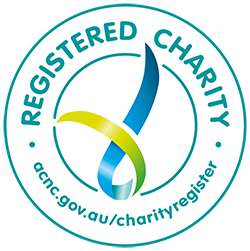Kay
Between 2005 and 2006 (while I was living in Scotland) I often had a bloated tummy. I went to my GP but as I was fairly young, slim, fit and apparently healthy he treated me as if I was vain expecting a completely flat stomach after two children. After three visits he eventually diagnosed irritable bowel syndrome. I never believed this to be what was wrong with me but I didn’t know what it could be or who I could go to for another opinion. Had I been listened to (and there if there was an effective test for ovarian cancer) I’m sure I would be dealing with stage I or, at worst, stage II cancer and my odds would have been be a lot better.
Eventually after more visits to GPs, a doctor in Brisbane thought I should get an ultrasound as I might have gallstones. The sonographer picked up five cancerous spots on my liver. She requested an immediate CT scan. I had a mass in my abdomen and bowel cancer was suspected. I was referred to the hospital for more tests. A colonoscopy and a test of my CA125 allowed the doctors to diagnose stage IV ovarian cancer, which had spread to my bowel and showed metastasis on my liver.
My CA125 (a blood protein test which can be used as a tumour marker but is not completely reliable in ovarian cancer as it can be elevated due to other conditions) which should be under 35 was 1300. I was given a 50/50 chance of surviving five years. The process from diagnosis to treatment for me was so quick that I didn’t get a chance to get my head around what was going on. It is so scary and your whole world is turned upside down. Your hopes and dreams for the future are suddenly challenged.
I have been on and off chemotherapy and have lost count – I must have had around 100 doses! I have had surgery three times. Ovarian cancer is very persistent and recurrence is very common. I was put on a trial drug but unfortunately the trial had to be cancelled as it did not meet the required expectations.
Fundraising to allow clinical trials and the development of an early detection test for ovarian cancer is essential. Some of the women that I’ve become friends with at the hospital have passed away. I hope to defy statistics and beat this cancer but I suspect the majority of people feel this way. I have never said “Why me?” – it is me so I have to get on with it. My friends all see me as positive and happy. I have my down times of course but I do not let them consume me.
I really appreciate the work that Cherish does and I’m sure anyone with this awful disease does too. I definitely wouldn’t be here today without the work of researchers and doctors. Thank you for listening to my story. Please share the symptoms of ovarian cancer!
